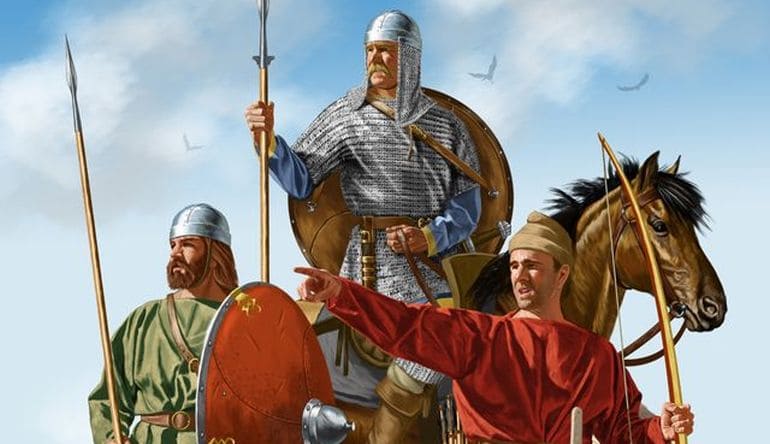(1) Hwæt! - thread on Hengest & Horsa because I feel like it. The information here will be mostly based on scholarship by J. R. R. Tolkien.
There's so much to discuss that I will necessarily only touch on a fraction of it here.
There's so much to discuss that I will necessarily only touch on a fraction of it here.

(2) The tale of Hengest & Horsa comes to us from the Anglo-Saxon chronicle, where they are famously invited over by Wurtgern (Vortigern), in the Chronicle the king of the Britons, to serve as mercenaries.
They do so, only to turn on the Britons after seeing how weak they are.
They do so, only to turn on the Britons after seeing how weak they are.

(3) Many theories have been proposed as to the origins of the story. As both their names are words for "horse", the dominant explanation for years has been that they are a myth - a reflex of the Indo-European horse-twins also seen in the Greco-Roman Castor and Pollux. 

(4) Though not unheard of, both "Hengest" and "Horsa" are also uncommon names, further feeding the idea that they may be legendary.
This fits a general historiographical trend of downplaying the reliability of ancient texts.
This fits a general historiographical trend of downplaying the reliability of ancient texts.
(5) *However*, there exists fascinating textual and philological evidence indicating that Hengest at the very least did actually exist. This comes to us from two perhaps surprising sources - the epic poem Beowulf and an incomplete poem called the Finnsburh Fragment. 

(6) Both poems describe the same event - a fight at a place called Finnesburg, the seat of king Finn of the then-powerful Frisians. The evident context of the battle was a visit to Finn's realm by the Danish prince Hnæf, which for unclear reasons spiralled into violence 

(7) Why is this relevant to our present subject? Because both texts, Beowulf and the Fragment, agree on the name of Prince Hnæf's chief retainer: Hengest.
When Hnæf is killed during the fighting, Hengest takes command. It is him who bargains with Finn and is focused on.
When Hnæf is killed during the fighting, Hengest takes command. It is him who bargains with Finn and is focused on.

(8) Now some broader context: The date of the fight at Finnsburh is likely around 450, at a time of upheaval in the region. Jutland, hitherto inhabited by the free Jutes, is being subjugated by the Danes, and the Frisians too are starting to feel the pressure of these Sæ-dene 

(9) It is in this general context that the story of Hengest & Horsa unfolds. The brothers were regarded as founders of the Jutish kingdom of Kent, and in Tolkien's reading, the very reason for the fight at Finnsburh was the presence of Jutes on both sides (with Hnæf and Finn)
(10)Essentially, Hengest and the other Jutes in Hnæf's retinue were people who, in response to the invasion of the Danes, joined their new masters.
The Jutes in Finn's household, meanwhile, were Jutes who fled the Danish invaders. There was bad blood between the two groups.
The Jutes in Finn's household, meanwhile, were Jutes who fled the Danish invaders. There was bad blood between the two groups.

(11) In the light of this, the motive behind the British invasion becomes clear: After Hnæf's death, Hengest was without pay and master. Meanwhile, the Jutes and Frisians were increasingly exiled from their homelands. They needed a new home, & Hengest needed pay - enter Britain. 



There is much more to be said here - I did not even discuss Hengest's son, the death of Horsa or the nature of the Half-Danes. Perhaps for another thread.
I suggest getting Tolkien’s book Finn and Hengest, by far the best work out there on the subject.
I suggest getting Tolkien’s book Finn and Hengest, by far the best work out there on the subject.

• • •
Missing some Tweet in this thread? You can try to
force a refresh






















